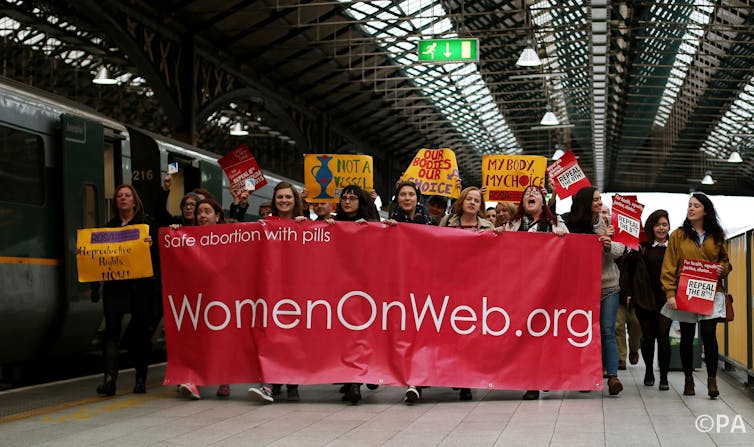A 21-year-old woman has been convicted in Northern Ireland) for using abortion pills to terminate a pregnancy. She is the first person to be convicted for illegal abortion in Northern Ireland in at least a decade.
The woman, who was 19 at the time of her arrest, is reported to have pleaded guilty to the offence of “unlawful procurement of miscarriage” under the Offences Against the Person Act of 1861. This archaic law threatens women who procure even very early abortions with a potential sentence of life imprisonment.
In this case, the woman was sentenced to a three-month jail term, suspended for two years. She had obtained the pills online, having been unable to afford to travel to England to have a legal abortion. Her housemates reportedly informed the police of what she had done.
The relative leniency of the sentence injects a welcome note of compassion but this is nonetheless a case of a young woman who had exercised her reproductive rights being punished under draconian law.
The 1861 act also applies in England and Wales but its harshest rules are mitigated by the later 1967 Abortion Act, which states that no offence is committed if abortions are carried out under conditions of strict medical control. But this act does not apply in Northern Ireland.
Not much of a choice
In Northern Ireland, women with unwanted pregnancies face a desperate dilemma. Some will manage to raise the £400 to £2,000 necessary for travel and the cost of an abortion elsewhere. They may seek money from loan sharks and the time needed to make these arrangements means that their abortions take place later in pregnancy than is the case for their sisters elsewhere in the UK. This creates a vicious circle. They may need to raise the additional funds necessary for a later, more expensive procedure.
Other women may drink bleach or deliberately throw themselves down stairs in an attempt to provoke a miscarriage.
A third group of women pursue the option of sourcing abortion pills online – which is what has happened in this case.
Among the many websites that supply the pills, two not-for-profit groups have become trusted suppliers to women in Northern Ireland: Women on Web and Women Help Women. Each offers abortion pills, on prescription, for use in the first nine weeks of pregnancy, for a donation of around £50 (which will be waived in conditions of financial hardship).

Women then take the pills according to the same straightforward, highly effective treatment protocol that might be used in an English clinic. It’s extremely safe, provided that they have access to necessary and appropriate aftercare in the small number of cases where it is required. Yet these women risk prosecution.
A dated law in changing times
While abortion remains an issue of heated debate in Northern Ireland, the law that makes abortion pills illegal is the product of another time. It is characterised by mid-Victorian moral norms and medical realities. It was intended to punish sexual immorality, as well as the intentional killing of a foetus.
The law also aimed to protect women’s health. At the time it was passed, there were no known methods to end a pregnancy without the woman also harming herself. This is reflected in the language of the statute, which prohibits the use of “poisonous or noxious substances”.
Yet the abortion pills that women access online are far from poisons: they are recognised by the World Health Organisation as essential medicines. In a similar case in Australia, a jury refused to accept that abortion pills were “noxious substances”. Having heard expert evidence on that issue, it acquitted the woman who had used them.
That prosecutions for illegal abortion have been so rare in Northern Ireland reflects the difficulty of enforcing existing law in anything other than a highly selective way. Attempting to prevent the delivery of abortion pills, for example, would involve searching for needles in haystacks. It also suggests a widespread reluctance to report, investigate or charge women for illegal abortions.
It is also worth remembering the near universal condemnation of Donald Trump’s ill-judged comment that women who have illegal abortions should be punished. Even those who are strongly opposed to abortion on moral or religious grounds very frequently agree that threatening women with prison should be no part of a civilised society’s response to unwanted pregnancy.
Those who are sincere in the desire to reduce the numbers of abortions should recognise that restrictive abortion laws do not result in fewer abortions. Their highly discriminatory impact is rather to force wealthier women to travel and poorer women to access illegal services. Abortions are pushed underground, making them less safe and harming – indeed, in some instances, killing – women. Reducing the number of abortions can only be achieved by preventing unwanted pregnancies and this requires focusing on sex education and access to contraception rather than threatening prison.
The arrest and subsequent prosecution of a desperate teenager should provide a clarion call for Stormont to face up to these facts.

